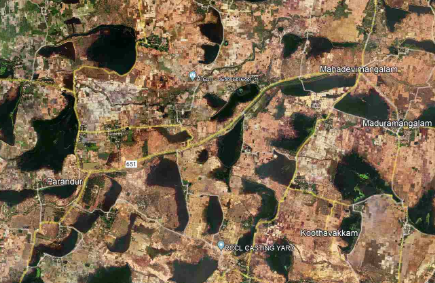Tamil Nadu Land Act Sparks Controversy Over Water Bodies
The Tamil Nadu Land Consolidation (for Special Projects) Act, 2023, was enacted on October 18, 2024. It aims to facilitate land acquisition for major infrastructure projects. However, the Act has ignited controversy among various stakeholders, including environmentalists and farmers’ groups. They argue it threatens water bodies and local rights.
Purpose of the Act
The Act intends to streamline land consolidation for projects that require at least 100 hectares. These projects can be industrial, agricultural, or commercial. The government argues that this process will reduce delays caused by fragmented land laws.
Controversial Provisions
A concern is that land, including areas with water bodies, can be acquired for these projects. In exchange, entities must provide alternative land. Critics fear this could lead to unchecked land acquisition and privatization of water resources.
Environmental Concerns
While the Act claims to protect water channels, critics believe it could worsen environmental degradation. The rapid passage of the law raised questions about the government’s motives and the lack of public dialogue.
K.K.S.S.R. Ramachandran, the Minister for Revenue and Disaster Management, defends the Act as a necessary measure to eliminate inefficiencies. However, activists argue that the law’s fine print allows for potential misuse.
Special Project Designation
The Act allows the government to designate any project needing over 100 hectares as “special.” This designation can expedite land acquisition, often without adequate environmental assessments. Public involvement is minimal; hearings occur only after project approval.
Local communities may lose their voice in decision-making. Once land is transferred to private companies, farmers and residents could face restricted access to water sources. The Act does not explicitly protect their interests.
Expert Committee Review Process
The Act includes a process for land consolidation proposals to be reviewed by an expert committee. This committee publishes proposals and conducts public hearings. However, critics doubt its independence, as members are primarily government-appointed.
The Act does not adequately safeguard hydrological pathways. These natural channels are vital for the ecological balance of water bodies. Encroachment on these inlets and outlets could have severe consequences for local ecosystems.
Compensation and Safeguards
While the law provides for compensating landowners and offering alternative lands, it lacks protections for those reliant on water bodies for their livelihoods. The role of the Tamil Nadu Pollution Control Board in this process is also unclear, despite pollution being a major concern near water bodies.
Historical Context
The pressing need for effective water body protection is underscored by recent data. In December 2021, the Tamil Nadu government reported that over 47,000 acres of water body land were encroached upon. This marks the urgency of safeguarding these ecosystems rather than permitting their conversion for large projects.
Month: Current Affairs - November, 2024
Category: States Current Affairs








